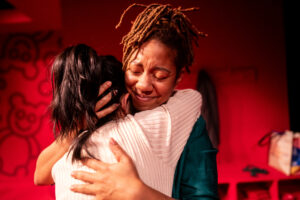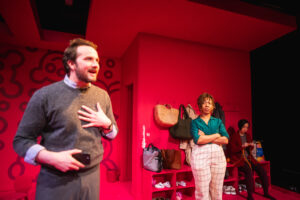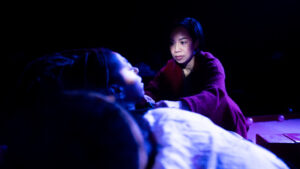
 ** “Mothers” uses the setting of a daycare center called Mommy-Baby Meetup (a/k/a My Mommy), which is thought to be a safe and secure environment for providing the best of care for children. Initially, we see anxious women who bond together in the lobby/waiting room as they watch their infants and toddlers play, but in the second act, the show rapidly turns into something very different when a major war breaks out. Initially, it seems like two different visions for a successful play have been merged together. But in fact, the two seemingly dissimilar parts are very much connected to each other—even though some of this may be lost on the audience.
** “Mothers” uses the setting of a daycare center called Mommy-Baby Meetup (a/k/a My Mommy), which is thought to be a safe and secure environment for providing the best of care for children. Initially, we see anxious women who bond together in the lobby/waiting room as they watch their infants and toddlers play, but in the second act, the show rapidly turns into something very different when a major war breaks out. Initially, it seems like two different visions for a successful play have been merged together. But in fact, the two seemingly dissimilar parts are very much connected to each other—even though some of this may be lost on the audience.
One mother (Vick, played by Krystel McNeil) is an attorney—and the other mothers wonder if she neglects her child in favor of her professional career. Another mother (Meg, played by Stephanie Shum) once studied for a career but now wants to have one child after another. And the third mother (Ariana, played by Caren Blackmore) is into natural and wholesome health and healing and is particularly self-righteous. Each mother believes that she knows best how to raise her child and thinks that her own baby is the most beautiful and can do no wrong. There is always a passive/aggressive tone to the mothers’ relationships with each other as evinced by their funny and biting dialogue. Self-centered in their own way, they snipe at each other and then make up. For example, they argue about whether vaccinations are essential and about the pros and cons of breastfeeding and for how long and about how women can (or cannot) balance their work-life with their home-life. Their friendly (or not so friendly) disagreements dissolve whether they see their child playing or acting out.
Also in the waiting area is the nanny (Gladys, played by Lynnette Li), who happens to be a mother herself. She spends her days watching her employer’s children, and she is a rather private person; the mothers think that she is strange. There is also a single dad (Ty, played by Alex Ireys), who largely keeps to himself and wonders how others perceive of his masculinity. While the father can be friendly and wants to be included in the group with the mothers (because after all, he has a child in daycare too), the women are suspicious of him and build a wall around themselves to keep him out.
An exceedingly nice touch is the use of stuffed toy bears (maybe 18” tall) to represent children during those moments when we need to see babies on stage. Even better is the fiction created by the orientation of the set relative to the audience, thanks to director Halena Hays. Initially, we see the mothers watch their children through some (imaginary) pane of glass that separates the waiting room/lobby from a room off-stage where their children are playing and being cared for. Feeling close to their children is illustrated by the women showing each other photos on their phones and hugging the large bears every so often. Generally speaking in the first act, the kids are usually off in another room, playing; whereas in the second act, we see them a lot more of them in person rather than through the glass. One of the best scenes is when a teddy bear, representing a child, drives a toy car that accidentally strays into the lobby.
The first act is wonderfully perceptive and contemporary as each of the characters take turns interacting with the others. But between the first and the second act, the show does a hairpin turn as an invading force takes over the area surrounding the facility, creating a catastrophe for all. The women and their children cannot go back to their homes. The only one who leaves the facility is Ty, the single dad, who meets the invaders off-stage (such that the audience is not privy to any of his conversations). We never are told who these conquerors are, and the characters never really discuss them, except we know that they have a monopoly on food and water and that their soldiers want to rape women. Are they invaders from another country or aliens from outer space? The only hint we have about them is that Ty wears a Russian fur hat later on in the performance.
When the situation radically changes and the story shifts gears, the daycare is no longer a safe haven. The day of reality and unreality meet. The normally passive/aggressive nature of these parents during peacetime and times of abundance gives way to overt violence and aggression. We witness how starvation and devastation wear down each of the characters, who will do anything and everything for the sake of sustenance and survival, including letting their baser instincts predominate.
The show makes the audience wonder whether the playwright Anna Ouyang Moench is making the point that people go back to their “true nature” during wartime, when they kill each other and do other immoral things. Does the playwright feel that men are fundamentally different from women and that it is civilization which places a check on brute instincts, such as raping women as being part of the spoils of war? Does the playwright feel that women by their nature are so competitive and so protective of their young that they will kill or torture without impunity? Does a woman’s “most important” function now become breastfeeding, which can supply nourishment in the absence of food? The question that this show asks is what is human nature, what is animal nature, and what is the role of civilization in preventing people from sinking into barbarity?
Lauren Nichols’ scenic design in the first act is nicely done together with Lily Anna Berman’s prop design. I especially liked all the different shades of pink (and the pink car) and all of the shoes neatly lined up in shoeboxes against the wall. However, at the very least, the set should have been trashed between the first and second acts or, better, replaced by a very different set that looks like a bombed-out room. The bright pink throughout should have been changed to gray due to fallout from bombing and missile attacks. Sound design by Jeffrey Levin and light design by Josiah Croegaert are good, especially when we hear sounds of airplanes strafing and see the lights flicker—and of course, the color red means death. Yet the women should have had blood on their faces, and their clothing should have been dusty and dirty. I especially want to credit intimacy/violence director Gaby Labotka and assistants Thomas Russell and Alyssa Vera Ramos in making sure that the actors felt comfortable with the close physical contact among them during several different scenes.
This is a story that made me cringe. Some aspects are so horrible that it’s like getting a sucker punch to the gut. When the chatty and catty first act lulls us into complacency, this makes the second act all the more unnerving. We watch how the parents hide their true feelings at the beginning but how these become unbridled later on, with the implication that each of us has a dark side that we normally keep under wraps. While it becomes clear that people change in unexpected and horrible ways when living through war, the problem with this show, however, is that, as time goes on, we tend to focus more on the grossness and brutality of the violence rather than ask ourselves the larger question of what civility means. What does it mean to live in a civilized society and how can war tear all of this apart? What can make people become so cruel? However, when we don’t see the enemy at all and have no idea who they are and what they are capable of—and when the situation appears to be more dystopian than real, the audience begins to tune out. The end result is disaster—but for whom?
“Mothers”, a production of The Gift Theatre, is playing through March 3, 2024, at the Filament Theater, 4041 N. Milwaukee Avenue, in Chicago.
General Admission Tickets are $17.00 – $49.00 including fees
Weekdays – $35.00 ticket
+ $4.00 Convenience Fee
Weekends -$45.00 ticket
+ $4.00 Convenience Fee
Students/Veterans – $15.00 ticket
+ $2.00 Convenience Fee
Performance schedule:
 Thursdays, Fridays, and Saturdays – 7:30 p.m.
Thursdays, Fridays, and Saturdays – 7:30 p.m.
Sundays – 3:00 p.m.
Additional performances: Monday, February 5th and Monday, February 19th – 7:30 p.m.
For more information about “Mothers”, see: https://thegifttheatre.org/on-stage/productions-events/.
To purchase tickets, go to: https://ci.ovationtix.com/36243/production/1143881 or phone the box office at 773-283-7071.
For more information about the Gift Theatre and to learn about their other offerings, visit: https://thegifttheatre.org/ or email boxoffice@thegifttheatre.org.
For more information about the Filament Theater and to learn about their other offerings, go to: https://filamenttheatre.org/.
To see what others are saying, visit www.theatreinchicago.com, go to Review Round-Up and click at “Mothers”.






More Stories
“Dummy in Diaspora”
“The Magic School Bus: Lost in the Solar System”
“February House” reviewed by Julia W. Rath